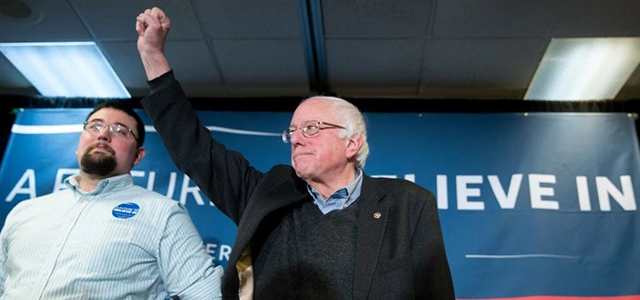News
Sanders goes Robin Hood with plan to make Wall Street pay for college

It isn’t often that a presidential candidate turns raising taxes into an applause line, but Bernie Sanders has done just that with his plan to tax Wall Street to pay for making college more affordable.
“We’re going to ask Wall Street to pay a tax on speculation,” Sen. Sanders (I-Vt.) said to huge applause on Monday during a Democratic presidential candidate town hall sponsored by CNN. “I believe that after the working families of this country bailed out Wall Street, maybe it’s their time to help the middle class of this country.”
The idea of taxing financial market trades to help pay for programs aimed at lower and middle-class workers has been a popular idea in liberal circles for years. But Sanders’ campaign has re-invigorated the idea with his pitch to hit big banks and Wall Street traders to help make college cheaper by making tuition free at public colleges and universities and loans for private institutions less expensive.
This so-called transaction tax is gaining traction among the Sanders’ growing progressive base and similar ideas have high-profile supporters, including Microsoft founder Bill Gates, Archbishop Desmond Tutu and hip hop mogul Russell Simmons.
If Sanders is elected there is little chance a proposal could ever be approved with a Republican-controlled House or Senate, but the recent fascination with the idea underscores that there remains a large group of voters who see Wall Street as a political villain. It also illustrates the enduring belief among liberals that the transaction tax is an untapped pot of gold.
Supporters call it a Robin Hood tax, taking from the rich and giving to the poor.
The general idea behind the proposal is to levy a tax on financial transactions, such as stock trades. Supporters argue it would raise a lot of money while also discouraging high-frequency trading, where firms make big profits from using technology to make trades more quickly than other market participants. Critics of this practice argue it adds no economic value to the financial system and can make markets less stable.
Sanders’ proposal is based on legislation he introduced with Congressional Progressive Caucus co-chair Rep. Keith Ellison (D-Minn.) last year that would add a surtax on all trades done by hedge funds, investment banks and speculators. Stock trades would be taxed at 0.5 percent, bond trades would be taxed at 0.1 percent and derivatives would be taxed at at 0.005 percent.
Experts from across the political spectrum generally agree that the tax would generate money for the government, but estimates of how much could be raised vary widely.
The Sanders campaign says the total could be as high as $300 billion per year. A recent analysis from the non-partisan Tax Policy Center estimates the plan could raise around $822 billion over 10 years. Critics say it could be a whole lot less.
Many conservatives say the plan creates a double tax since traders are already taxed on capital gains and would make markets inefficient by discouraging investments. They also contend it would hit people saving for retirement.
Kyle Pomerleau, an economist at the conservative Tax Foundation, said Sanders’ estimate doesn’t take into account how shareholders and traders will react. Some could decide to stop trading or dramatically scale back on their investment activity just to avoid paying the tax.
“This behavioral shift will reduce potential revenue because the tax shrinks its own base,” Pomerleau said. “The amount of shifting and avoidance depends on design. A poorly designed tax can actually lose revenue for the government.”
Sanders argues the success of the tax is easily demonstrated in other major western countries like Germany, Japan and the United Kingdom. A group of 10 European Union countries have been pushing to pass an EU-wide transaction tax for years, but have not been able to convince smaller member nations with loose rules to crack down in hopes of collecting more cash.
The United States even had a very limited version of a financial transaction tax from 1914 to 1965.
But the idea fell out of favor and Wall Street backers like the U.S. Chamber of Commerce, TD Ameritrade and UBS Americas have lobbyied on the issue in recent years, according Senate records.
Supporters of the tax began to reemerge in the wake of the 2008 financial meltdown that led to what is now known as the Great Recession. Protesters wearing green bycocket hats, better known as Robin Hood hats, started appearing at congressional hearings on bank regulation. They even filled part of the crowd during the 2013 Senate confirmation hearing for Treasury Secretary Jacob Lew.
Green hatted Robin Hood Tax backers were active in the Occupy Wall Street movement and frequently appear at Sanders rallies across the country touting giant cut outs of Sanders with their signature chapeau.
The group’s website boasts support from well-known economists and budget experts like David Stockman, the former White House budget director under President Ronald Reagan, and former Vice President Al Gore.
The idea has never gained the support of the Obama administration, with both Lew and his predecessor at Treasury, Tim Geithner, saying they oppose the tax.
That hasn’t stopped Sanders’ Democratic rivals for president from backing a scaled down version of the idea. Both Hillary Clinton and Martin O’Malley have backed limited levies on Wall Street trading, but neither makes it a major portion of their economic pitch.
Clinton has proposed a tax on high-frequency trades made by automated computer programs and O’Malley mentions a financial transaction tax in his Wall Street reform proposal, but does not offer specifics.
Sanders thinks he’s found a winning issue.
“I believe that every kid in this country who has the ability and the desire should be able to get a higher education regardless of the income of his family,” he said at Monday’s town hall. “And I will pay for that through a tax on Wall Street speculation.”